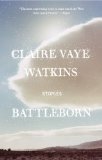Summary | Excerpt | Reviews | Beyond the Book | Readalikes | Genres & Themes | Author Bio

Critics' Opinion:
Readers' Opinion:
First Published:
Aug 2012, 304 pages
Paperback:
Aug 2013, 304 pages
 Book Reviewed by:
Book Reviewed by:
Norah Piehl
Buy This Book
Their stepfather points to the desert. “There,” he says. A flash of light across the basin. An orange mushroom cloud erupts, rolling and boiling. Seconds later, she hears the boom of it, like a firework, and the trailer begins to sway. Impossibly, the heat warms my mother’s face. “Makes you think,” her stepfather says softly in her ear. “Maybe there’s something godly out there after all.”
The blast is a 104-kiloton nuclear explosion. It blows a hole into the desert rock, creating the deepest crater of all the Nevada Test Site’s 1,021 detonations: 320 feet deep. The crater displaces seven hundred tons of dirt and rock, including two tons of sediment from a vein of H. T. P. Comstock’s cursed soil, a finger reaching all the way down the state, now blown sky-high in the blast. The July breeze is gentle, indecisive. It blows the radiation northeast, as it always does, to future cancer clusters in Fallon and Cedar City, Utah, to the mitosing cells of small-town downwinders. But today it also blows the curse southeast, toward Las Vegas, to my mother’s small chest, her lungs and her heart. And it blows southwest, across the state line, all the way to the dry yellow mountains above Los Angeles. These particles settle, finally, at 1200 Santa Susana Pass Road.
We might start with George’s longest year: For nearly twenty years, George’s letters to his son, Henry, back home in Pennsylvania were characteristically dry, questions about herd count, tips for working the swarm at honey harvest; he hardly mentioned his own ranch, which to his son would not have seemed a ranch at all.
But by the early 1960s the demand for Westerns began to wane and George Spahn blamed, among others, Alfred Hitchcock. He increasingly ended his notes about farm business with aggravated rants about “cut-’em-ups,” and“ sex-crazed” moviegoers’ fixation on horror films, probably meaning Hitchcock’s Psycho, the second-highest-grossing film of 1960, after Swiss Family Robinson. On the first day of February 1966, George Spahn filed for bankruptcy. By then, unbeknownst to George, his wife’s kidneys were marbled with tumors. Six weeks later, at UCLA Medical Center, Helen died from renal failure on the same floor where my father would die thirty-four years later. The coroner’s report noted that her tumors were visible, and in the glaring light of the microscope seemed “like hundreds of hairlike silver ribbons.”
After Helen’s death, George neglected the few already tenuous ties he had at the big studios. He wrote Henry often, spoke of the ranch deteriorating, of weeds pushing up through the soil in the corrals.
“I’m tired,” he wrote to his son on July 23, 1966. “Let most everyone [three part-time ranch hands] go. It is hot here. So hot I have to wait for dusk to feed the horses. They get impatient down in the stalls and kick the empty troughs over. Boy, you wouldn’t believe the noise of their hoofs against the metal . . .”
In the end it was the horses, thirsty or not, that kept Spahn’s Ranch afloat. Spahn rented the horses to tourists for self-guided rides through the hills. Occasionally, a few of George’s old studio friends would throw business his way, sending for six or eight paints when a scene couldn’t have needed more than two. And so the horses became George’s main source of income, meager as it was. The Los Angeles County tax records show Spahn’s annual income in 1967 to be $13,120, less than a quarter of what it was in 1956.
In previous letters, George rarely wrote of Helen. When he did his lines were terse, referring to her only along with other ranch business: “Storm coming in. Your mother’s knuckles would have swelled. Lord knows we need the rain.”
That year, George continued to write even as his eyesight failed, his lines sometimes piling atop one another. He began to write of Helen more frequently, sometimes devoting an entire page to her blackberry cobbler or the fragrance of her bath talcum. These are the only letters in which George, otherwise a deliberate and correct writer, slips into the present tense.
Excerpted from Battleborn by Claire Vaye Watkins. Copyright © 2012 by Claire Vaye Watkins. Excerpted by permission of Riverhead Books. All rights reserved. No part of this excerpt may be reproduced or reprinted without permission in writing from the publisher.





The Funeral Cryer by Wenyan Lu
Debut novelist Wenyan Lu brings us this witty yet profound story about one woman's midlife reawakening in contemporary rural China.
Your guide toexceptional books
BookBrowse seeks out and recommends the best in contemporary fiction and nonfiction—books that not only engage and entertain but also deepen our understanding of ourselves and the world around us.